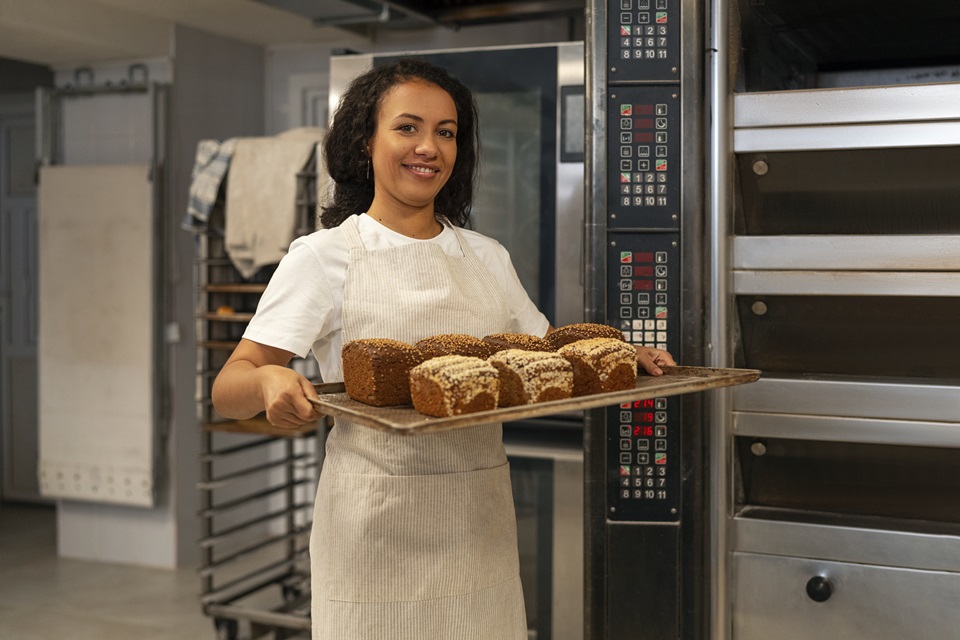Starting a bakery business is exciting! However, success depends on having the right equipment.
A well-equipped bakery is essential for selling delectable creations online or in a physical store. Therefore, running a successful bakery requires skill and knowledge about taste, ingredients, and processes.
Moreover, bakeries require specialized equipment compared to other restaurant business models.
Decide which equipment is necessary for the operation and set aside money for its purchase as part of your bakery’s business plan.
To bring the fresh smell of baked goodness, let us understand the necessary baking equipment to meet your quality and taste demands.
Table of Contents
The Basic Essentials
Every bakery has a set of basic equipment that marks the beginning. Here are the five basics that you can’t skip and how to choose them when opening a bakery—
1. Oven
Choosing the right baking oven is crucial for your bakery’s quality, efficiency, and productivity. Each oven has unique features, making it better suited for specific products.
However, when choosing an oven, you must consider factors like product volume, focus on artisan bread, delicate pastries, and internal capacity.
Therefore, an energy-efficient oven with double-pane windows is ideal for most bakeries. It must have programmable controls, insulation, and optimal heat retention to optimize energy use and save money in the long run.
Moreover, Deck ovens are ideal for bread production. These ovens come with a stone baking surface that helps retain heat. Therefore, they bake items with the radiating heat, which allows them to cook completely and uniformly.
Thus, you can add items like pizzas, bagels, and artisanal bread with a crisp outer crust to your bakery menu.
Lastly, you can also get convection ovens for baking cookies, pastries and baked delicacies like croissants. However, you can find better options for bread production.
2. Dough Sheeter
Commercial dough sheeters are essential for home and professional bakeries, as they are used all day long in pizza centers, cafes, restaurants, and bakeries.
Durability is crucial, and a machine made of stainless steel is essential for quality.
On the other hand, professional bakeries require a large machine that can adjust the dough’s thickness. This is because different items require different thicknesses.
Thus, the most crucial consideration when choosing a dough sheeting machine is if the Teflon belt is food grade. These belts are suitable for handling food materials due to their natural rubber and special raw materials.
Thus, when choosing a commercial dough sheeter for professional bakeries, consider everything from durability to rollers and belts.
3. Mixers
When choosing a mixer for a bakery, the availability of space and purpose will help you decide the size.
Based on these factors, you can choose from horizontal to spiral mixers. While the former is more suitable for bulk mixing, the latter helps you prepare crusts and dough.
Therefore, you must consider the type of food they plan to create and the consistency of the dough you need.
Moreover, mixers typically range from 60- to 140-quart capacity depending on product volume. Proper mixer capacity affects productivity, quality, and efficiency in the kitchen.
However, manufacturers provide capacity charts for specific ingredients and applications. The recommended maximum capacity depends on the dough’s moisture content.
4. Refrigerator
Different products require different storage conditions.
For instance, delicate items like cream-filled pastries or chocolate-based desserts need lower temperatures and specific humidity levels.
However, a display refrigerator with temperature controls is a better option for things like bread and pastries that are best served warm.
The fridge or other storage area should, therefore, maintain the quality of your goods and present them in an eye-catching manner to draw in customers. Choosing the right display fridge is crucial for presenting and preserving cakes and pastries.
Moreover, you must consider your budget and the purpose of the fridge.
You need a display cabinet and an additional fridge underneath to store other food items like butter or prepared ingredients. Displaying these items alongside cakes may not be appealing to customers.
5. Bread Slicer
A bread slicer is a vital tool in the bakery industry, ensuring precision and efficiency. Therefore, it is essential to ensure consistency and uniformity when you’re selling bread slices. These details enhance the presentation and boost customer satisfaction.
There are two main types: manual slicers and automatic bread slicers. While the former is suitable for small-scale bakeries with lower production volumes, the latter is designed for higher production levels and requires hands-free operation.
Automatic bread slicers are ideal for busy bakeries or those offering a wide range of bread types. They process larger quantities with consistent precision, allowing for adjustable slice thickness.
Moreover, safety features like blade guards, emergency stop buttons, and overload protection are essential for operator well-being.
Thus, when choosing a slicer, consider your bakery’s production volume, accommodate the range of bread types, prevent wastage, and ensure uniform slices.
Manage Your Bakery
Effective inventory management is crucial for a bakery to prevent wastage, ensure adequate supplies, maintain quality control, streamline operations, and plan for growth.
Therefore, by tracking ingredients and equipment, businesses can minimize expiration risks, save resources, and maintain consistent quality.
This is especially important for bakeries with signature recipes and distinct flavor profiles. A well-organized inventory system reduces time spent searching for ingredients and allows staff to focus on creating delicious treats.
Understanding consumption patterns and equipment usage helps make informed decisions about scaling the business.



